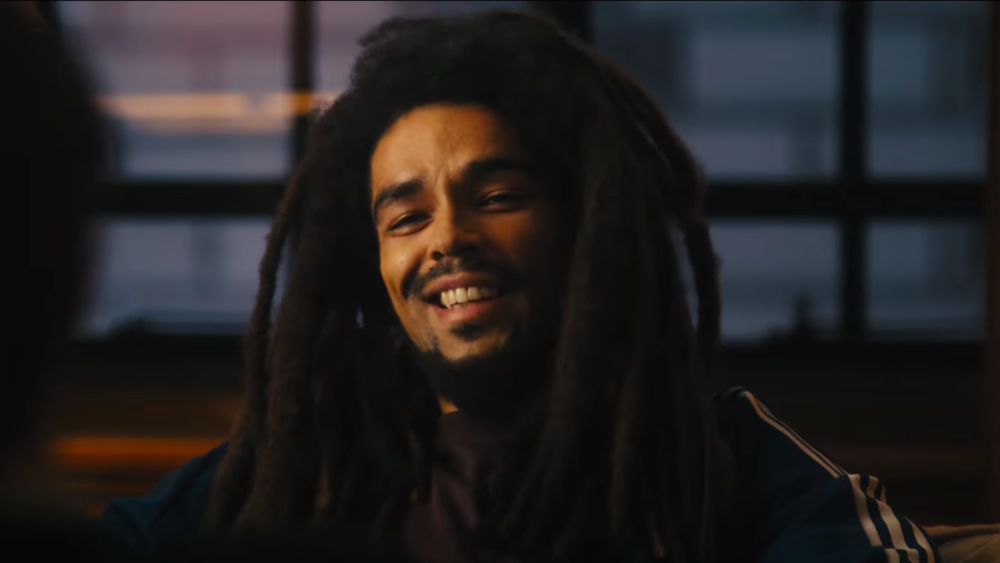
How would you feel about a regular weekly column that reasserts your belief system, while offering little in the way of challenging new ideas, criticism or even the vague notion of discomfort? What if we could offer you a mild, easy, semi-pleasant reader experience you'll forget in less than 300 seconds? Would that be something you'd read? Would you pay $4.99 a month for it? Maybe you'd be willing to sit through an ad ...
DAVID BLOOM: Welcome back to the living, Dan, after your college tour with sullen son No. 2 to investigate lower-tier college sports options. Your jaunt makes the perfect little amuse bouche to kick off my list of the week’s notable news: i.e., Hub Entertainment Research talked to a bunch of sports fans about how important sports is to them.
Also read: Hub Study Says Sports May Settle the Streaming Wars
The findings seem a bit of self-reinforcing: sports fans, by self-definition, care a lot about sports. But given that sports and horror (and maybe reality shows) seem to be the only flavors of entertainment that people show up for religiously, maybe it’s really important. The streaming services and their parent companies in particular are figuring out what next after years of ruinously expensive Peak TV spending on premium scripted entertainment. Maybe sports is the answer, Hub suggested: "As expensive as rights have become, they may turn out to be the best investment: hours and hours of unique content which comes with a built-in audience that tunes in every season without fail.”
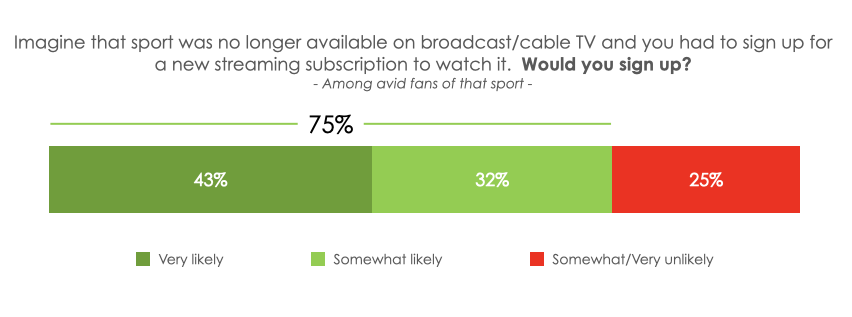
But the study’s suggestion of urgency here makes me think we’re just puffing up yet another economic bubble of overpriced content that can’t make back its money three years from now. Bubbles are particularly on my mind in a week when Nvidia’s blowout earnings sent its shares (and those of many other loosely connected companies) sky high thanks to its artificial intelligence prowess. So, any thoughts on whether we’re heading to twin Uber-bubbles for AI and sports TV rights? Can streaming companies sit out, say, the NBA negotiations and still be relevant? This is particularly pertinent given Warner Bros. Discovery’s a.) current NBA rights and b.) simply horrible quarterly earnings also announced this week (it’s now an $8 stock, down about two-thirds from its debut almost two years ago).
Also read: NBA-Warner Bros. Discovery Talks Are ‘Constructive and Productive,’ David Zaslav Says
DANIEL FRANKEL: I'm not sure the coming next NBA deal in 2025 will be the watershed that transforms sports rights into a business that only tech companies with giant market capitalization can play, but that does seem to be the direction. Will Paramount, or Disney for that matter, be able to participate in the NFL beyond 2033? I mean, when you're building off of a $110 billion previous deal, how high do you go? But explain to me, because I've been in a hole of respiratory illness and bad travel the last five days -- what happened with Warner Bros.?
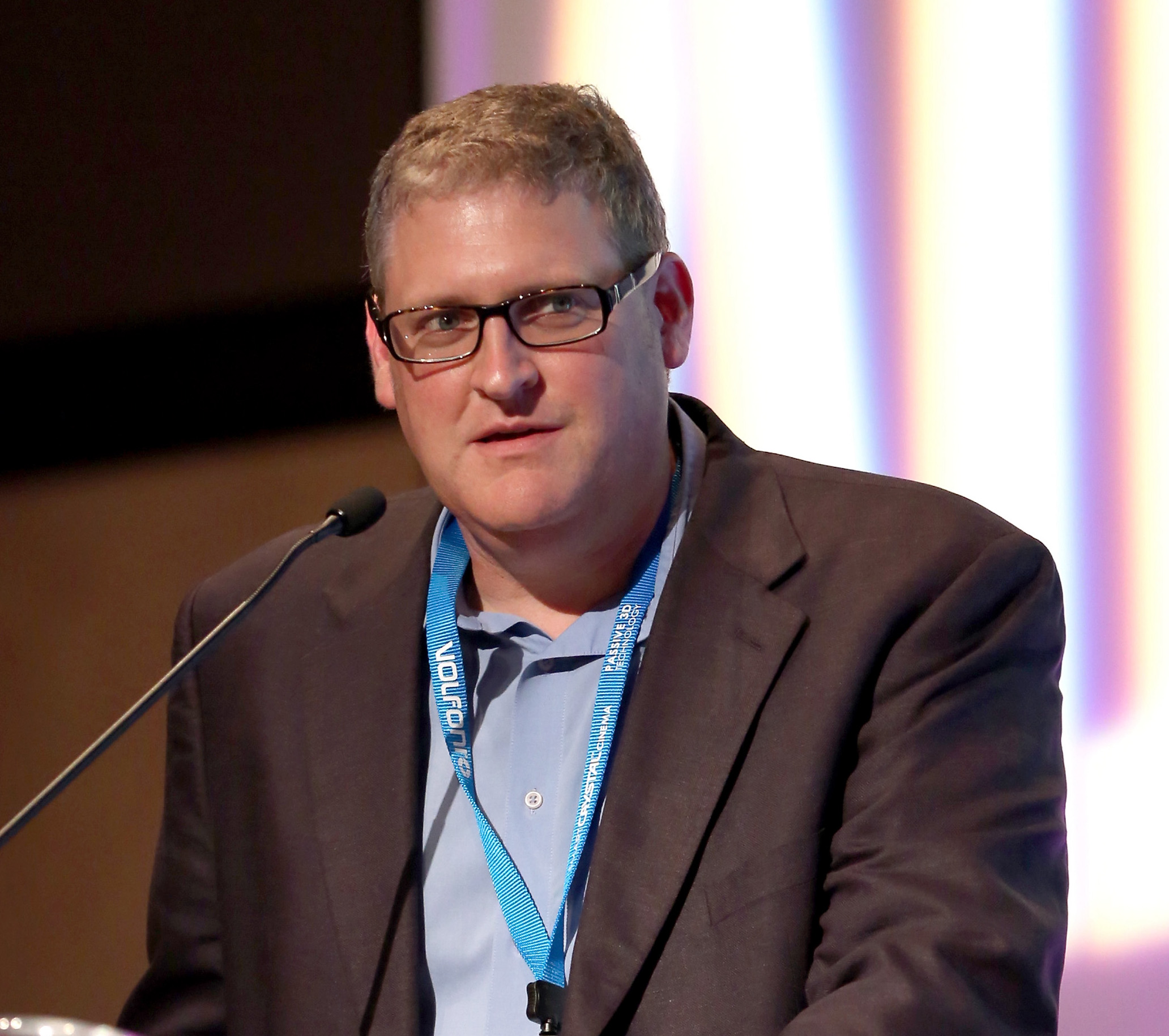
BLOOM: It’s hard to envision what “Paramount” looks like in nine years, if anything, given the very urgent conversations the company is having with possible buyers. This week, Standard and Poor’s put Paramount Global on “credit watch” because of its weak cash flow trends. Cash flow definitely wasn’t the problem for WBD, which reported more than $6 billion of free cash flow in 2023, helped by all the cuts (with more coming!) and $1 billion of non-spending during the strikes. Though WBD executives want to reduce that brutal $43 billion in debt, they also want more deals (with more debt, and more cutting), for the right price. As is common in earnings season, WBD executives emphasized the happy bits, such as the paltry but first-ever streaming profit of $103 million, and a rise in global streaming subscribers. But WBD also lost U.S. streaming subscribers, saw linear ad revenues drop more than anticipated, and likely will lose money on their European Olympic rights this summer. Analysts were lukewarm.
Needham’s Laura Martin kept the stock on hold, writing it's “too early to buy WBD.” MoffettNathanson’s Robert Fishman said “it’s hard to ignore the risk” that WBD's “Spulu” sports-focused skinny bundle with Fox and Disney will further cannibalize cable subscriptions while making cable renewal negotiations far more difficult.

LightShed Partners’ Rich Greenfield tracked WBD executives' steadily melting earnings projections the past three years, from $14 billion in May 2021 to barely $10 billion this past week, without any future guidance: “...it is hard not to suspect 2024 EBITDA will be below reported 2023 levels, given the headwinds facing both linear TV advertising and affiliate fees.” Wall Street, in response, was anything but lukewarm, dropping the share price almost 13%. So, not great, though I’m sure Zaz and Weedz are excited regardless. Their compensation is now, surprise, surprise, calculated on cash flow rather than share price. Shockingly good timing for them. Zaz might buy yet another media mogul’s mansion, or perhaps one of Jeff Bezos’ smaller yachts.
FRANKEL: Zaz has it pretty good, but it struck me this week to read that Jeff Gaspin, formerly chairman of NBCU Television Entertainment -- a chairman, Jerry! -- is now merely a VP-level foot soldier under Ted Sarandos. Maybe Zaz can get a job title like that in a few years.
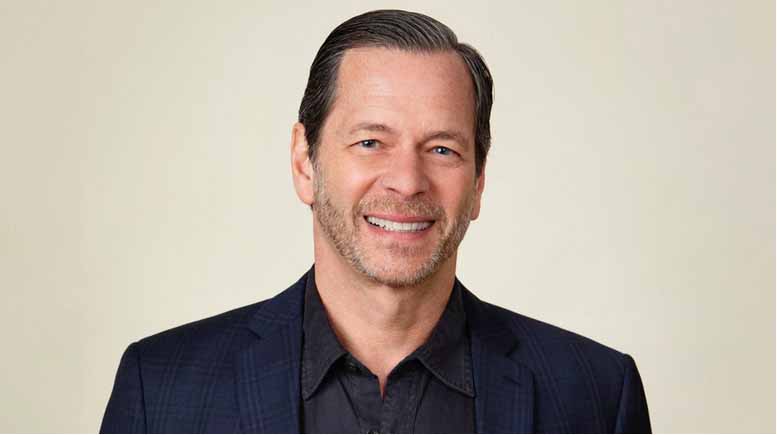
BLOOM: As someone who benefitted at one point in his life by the radical title inflation of Hollywood, and saw the opposite of it in a couple of stints in technology, the title matters less than the stock options and the in-office ping pong table. Gaspin is a few levels down from Sarandos, though, just like he was within Comcast’s hierarchy. Speaking of old timers departing from studio sinecures, can we pour one out for Sam Waterston, who spent 19 seasons and 405 episodes as Manhattan District Attorney Jack McCoy over a 30-year run? He’s not Gunsmoke’s James Arness, but probably as close as we'll see in this era of television. At 83, Waterston has certainly earned a break, but I’d be remiss if I didn’t mention his 60-year acting resume also includes an Oscar nomination for his role as the New York Times writer in Roland Joffe’s brilliant, brutal The Killing Fields. (I’d also be remiss if I didn’t mention an equally brilliant quasi-spinoff from that, Spalding Grey’s monologue-as-movie Swimming to Cambodia). What are the odds anyone coming up gets even 10 seasons in a role in the future?
FRANKEL: In the parlance of Training Day's brilliantly written and acted dirty detective, Alonzo Harris, I wonder how many fictional "man hours of incarceration" Mr. Waterson was responsible for. Who knows? But Dan Castellaneta, Hank Azaria and the rest of the enduring voices of The Simpsons aside, I don't know that we'll ever see TV longevity like that again. So yes, I totally agree with you.
And yes, this leads me to another episode of If These Old Dead Formats Could Talk. I just spent four days with some old family friends in an Oakhurst, Calif., Vrbo, right outside Yosemite. My adult friends, both seriously high-IQ'd nerds of all things computer, fantasy and music, remain on the bleeding edge of general adoption, well into their fifties. They consume media as a veritable hive mind with their teenage kids. That includes the online video taste of their 16-year-old son, who traveled with us, and their 18-year-old daughter, who was a few hundred miles away, studying at UC Santa Cruz, but seemed almost among us most of the time on mom's phone speaker. During our down time from hikes, if this uber-close family wasn't watching K-Pop videos on TikTok together, they were taking in fast-talking YouTube series focused on breaking down music and pop culture. I tried to talk them into some Netflix at one point (specifically, the Coen Bros.' should-be classic, The Ballad of Buster Scruggs), but they weren't having it. The wonderfully brilliant Bren and Jerri, respectively an IT guy for a fund-management company and an ICU trauma nurse, are certainly a consumer anomaly as a couple, but I suspect their equally bright children are not. They simply have no interest in movies or TV shows.
I arrived home Friday with severe bronchitis. Fearing the social peril of productively hacking away in the stands alongside the wife on a surprisingly warm February night for my son's high-school baseball season opener, I found an alternative place of total isolation: the local movie theater, to watch Bob Marley: One Love. I was, save for my buddy Curt, who braved viral illness to hang out with me, the only soul in the Crenshaw Cinemark Theatre 10 at 4:40 p.m.
Maybe it was the meds talking, but the whole experience felt ... dead, including the pre-trailer promo reel, which featured an interview with a "movie star," 54-year-old Jack Black. As for the movie and its 42% Rotten Tomatoes score, the one-dimensional screenplay couldn't be saved by the solid performance of star Kingsley Ben-Adir, who plays the reggae-legend title character. I was out cold after about 40 minutes, slipping in and out of consciousness, convinced the mercurial ball coach was going to bench my hard-headed, smart-mouthed boy in the opener. Turns out the kid came in to relieve in the top of the third inning, ended a bases-loaded jam, then retired the next 11 batters, eight of them by strikeout, in a combined no-hit gem vs. North Hollywood. I should temper my takedown of the Bob Marley biopic -- while sick and pre-occupied with my son's sports playing time, I came in wanting to understand the artist, but also the broader context of Jamaica in the 1970s, still trying to break free of conflict and colonial shackles. I was awake enough to know we never got remotely close to that narrative destination. I briefly chatted about it Sunday evening with my neighbor, Dennis, who grew up in Jamaica ... in the 1970s. He and his daughter saw One Love on premiere night. He said he was gravely disappointed in the film, for many of the same reasons. Now, in terms of our broader discussion, it should also be noted that Paramount Pictures' Bob Marley: One Love has actually performed well at the domestic box office in its first few weeks. Apparently, the West Adams/Leimert Park area of Los Angeles isn't necessarily Peoria when it comes to predictive box office performance.
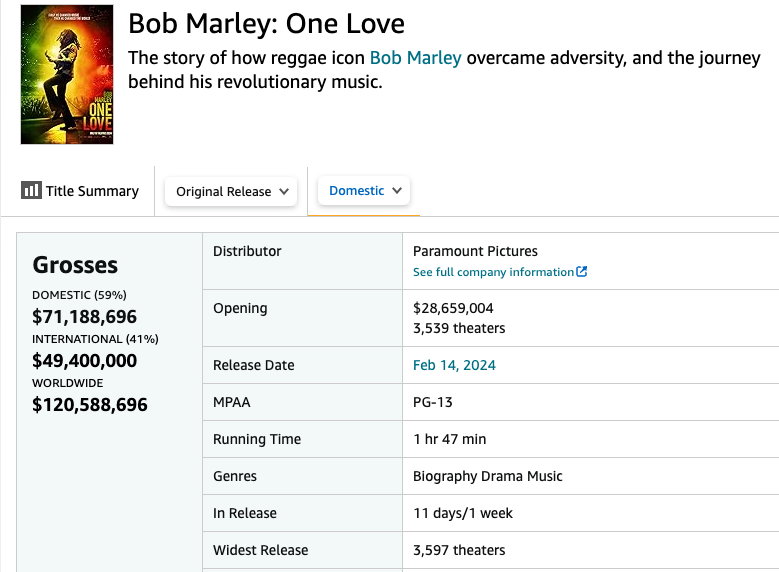
Still, for me/I personally, my son's performance and the evening around it were described as electric by several parents of teammates. New York Jets fans of a certain advanced age will always have the "Heidi Game." And I'll have the Bob Marley: One Love game.
BLOOM: Having a theater by yourself to watch movies and/or pass out in? Now you’re Living the Zaz Life! Your son will probably forgive your absence, as much as sullen teen sons forgive anything. But your friends’ family media habits are certainly out of phase with their generation. Having kids can do that. More interesting is they can’t be bothered with Netflix. YouTube is still No. 1 in streaming worldwide, and keeps feeding the videos until you cry uncle and take some cold meds. Makes me wonder if Netflix's live broadcast of the SAG Awards Sunday night will make any impact whatsoever.
It’s never been a big deal, but it’s generally indicative of where actors, the Motion Picture Academy’s biggest branch by far, are leaning for Oscar love. Given that Netflix likely won’t offer up real viewership numbers, I’m wondering what counts as a win for one of Netflix’s first-ever live broadcasts? No service interruptions? Outdrawing the Independent Spirit Awards streaming the next night on YouTube? Free sparkling water for Jeff Gaspin? Awards shows in general seem like a linear programming leftover but maybe audiences will take to NetSAG like they took to that streaming-only NFL playoff game. Certainly, the SAG Awards people would be over the moon if their show attracted 23 million viewers. As for the Spirit Awards, those are mostly an excuse to have a party on the beach. The streams are mostly connected to all the champagne being consumed.
FRANKEL: As I wax on about my roadtrips, movie experiences and sports-parent anxiety, I want to shift over to a subject that is also apparently very important to us entertainment/media trade reporters, ourselves. Just as it was a 15 years ago, when Nikki Finke and the Hollywood "blog wars" first emerged, the smoke out of the showbiz newsletter scene is getting ... selfier and selifer. Now, admittedly, some of us career-misguided folk use terms like "I," "me" and "my" too often in our work.
There’s a common misconception that my sources have a vested interest in what I report & I’m being manipulated to do their bidding but studios/agents don’t PLACE stories w/ me. I’d love them to. But my network helps me TAKE stories from institutions trained to leak only to tradesFebruary 23, 2024
Our wages and razor-thin job security should be enough to justify the foibles of collective narcissism. But in case we need more reminders of how lowly and sad we are -- other than executive-level managers and IT folks who could utterly take or leave us -- we have the often hilarious Richard Rushfield and The Ankler, who this past week eviscerated any remaining vestige of dignity and self-respect we might have left. In his "field guide" to Hollywood survival, Richard outlines a "needy," petulant but "easily steamrolled" nuisance: trade reporters. (I felt vulnerable at "easily steamrolled.")
Here's how he describes "the players," the upper strata of our peer group: "At the top of the ladder are those who imagine they have leapt out of the reporters’ camp entirely. These long-time veterans have studio chiefs on speed dial (and have been on the beat long enough to remember speed dial). They imagine themselves not covering the poobahs, but advising them, almost like consultants, and some enjoy talking about how fast someone important returned their call, often earning the eye-roll of colleagues and observers.The great yearning of every reporter is to be taken seriously, but with these people, the need to be part of the poobah club borders on desperation. They affect hard-nosed, no-nonsense business savvy, but are actually the neediest people in the industry, desperate for any sign that their lifelong obsession with the studio elites is reciprocated. Indeed, you might find them begging for Golden Globes tickets, or complaining about their seats at screenings, in the background."
For someone who closed out his days at pre-Penske Variety, penned in a quadrant of cubicles with some legit (and quite talented) trade divas, this hit the target right in the bleedly-red center. I must also say it did feel a little hypocritical coming from a digital news platform, The Ankler, backed by career "player" Janice Min, the former US Magazine and Hollywood Reporter editor-in-chief who ended up flying too close to the twin rotor blades of Jeffrey Katzenberg and Meg Whitman at Quibi just before the chopper went down in a fiery ball of grave market miscalculations. It is funny, no doubt. Almost as funny as that "LiMu Emu & Doug" Liberty Mutual commercial spoof on SNL Saturday.
BLOOM: Et tu, Brute… Yeah, Rushfield has been following Hollywood from a near distance for a very long time, though like my former employer Nikki Finke, has long gloried in his insider-outsider status while harrumphing about the industry's many shortcomings and problematic personalities. Then again, curmudgeons can be fun to read, and a nice digestif after the overly fatuous or reflexive coverage that too often characterizes the typical trade journalist’s everyday output. The entertainment trade journalist is a chimerical beast, though. Journalism demands standing apart, critically evaluating the industry you’re covering. The miserable business of journalism pushes journalists to not be too hard on the executives and companies writing the advertising checks to the publication that’s employing them. It’s pretty much the same challenge for anyone forced by their job to find keys for deep access to a tightly guarded kingdom while not actually joining said kingdom as a permanent vassal. And like Sally Field at Oscar time, we all want to feel like someone really, really loves us, especially if they’re really important in the world where we operate.
Maybe Dick is just mad that The Ankler didn’t get as much awards ad money dished its way in this peculiar Oscar season, unlike past years where that outlet was reportedly bragging about how much it raked from studios that didn’t just want to scrawl out a massive check to Jay Penske. It’s amusing that Rushfield is savaging people who aren’t much different than him, rather than the people and companies we’re all supposed to be covering with, ideally, some rigor and critical remove. But complaining about the media, even by the media, has been around at least since Martin Luther nailed up that little world-changing protest on the church door in Germany. Why stop now, especially if you’re still hoping for some late FYC ad dollars?







